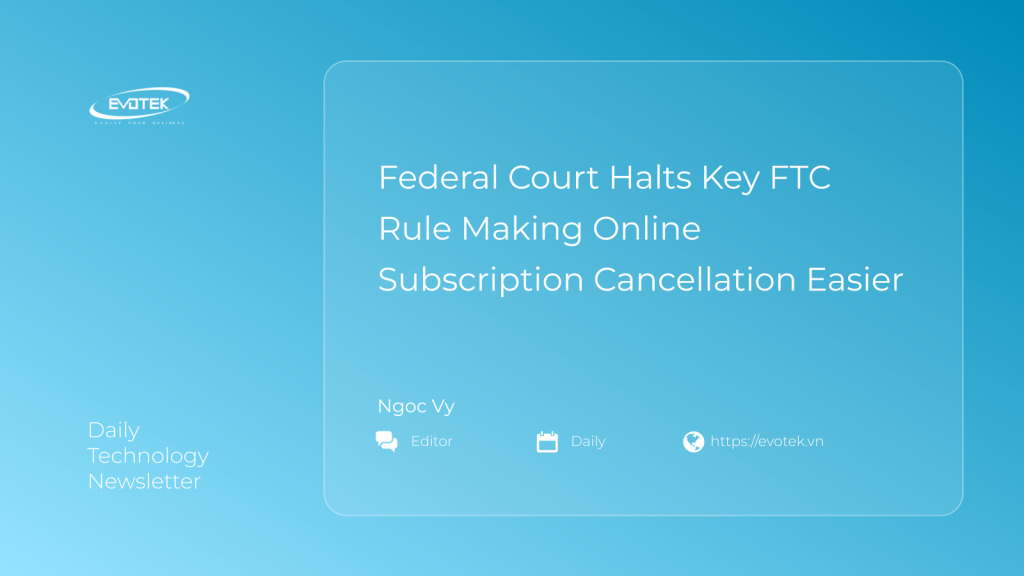A significant setback for consumer protection has emerged following a federal appeals court’s decision to block the enforcement of a crucial Federal Trade Commission (FTC) regulation. This rule, designed to simplify the cancellation of unwanted online subscriptions, memberships, and auto-renewals, would have mandated that companies make it as easy to cancel as it was to sign up.
The Rule’s Intent and Unexpected Halt
The FTC’s “click-to-cancel” rule aimed to address widespread consumer frustration by requiring businesses to offer cancellation processes that mirror their sign-up procedures. If a service could be subscribed to with a single online click, then it would have to be equally simple to unsubscribe. Similarly, phone sign-ups would necessitate phone cancellation options.
However, the U.S. Court of Appeals in St. Louis vacated the rule just days before its scheduled July 14 enforcement. The court’s decision cited a failure by the FTC to follow proper procedural guidelines, an accusation previously denied by the commission. While the ruling noted it did not “endorse the use of unfair and deceptive practices in negative option marketing,” the outcome is a blow to consumer advocates.
The FTC has not officially commented on the ruling, stating it is considering its options. However, with the commission now chaired by a Republican who voted against the rule last year, an appeal appears unlikely. This aligns with a broader trend under the current administration, which has generally shown less support for new consumer protection regulations.
Erin Witte, director of consumer protection at the Consumer Federation of America, expressed strong disappointment, lamenting that extensive consumer feedback on subscription traps was seemingly insufficient against corporate opposition.
Why the “Click-to-Cancel” Rule Was Essential
Subscription programs span a vast array of services, from streaming platforms and gym memberships to automated cosmetic and supplement deliveries. While they can offer benefits like convenience and discounts, the FTC developed the rule in response to thousands of annual complaints detailing the tedious and time-consuming obstacles customers faced when trying to end these services.
Beyond simplified cancellation, the rule would have also required companies to “clearly and conspicuously” disclose vital information. This included the amount and frequency of recurring charges, cancellation deadlines, and when initial promotional prices might increase. Consumer advocates had high hopes that these “common sense” provisions would significantly improve transparency and prevent consumers from unknowingly paying for unwanted services.
Navigating the Post-Ruling Landscape: Consumer Self-Protection
Despite the court’s ruling, there’s a silver lining: many companies, especially those with online subscription models, have already transitioned to more transparent cancellation policies. This shift is partly due to existing state laws, such as those in California and New York, which offer similar consumer protections.
Nevertheless, consumer vigilance remains paramount. U.S. PIRG, a consumer watchdog group, offers essential advice for anyone considering a subscription or recurring purchase:
Essential Tips for Consumers:
- Read the Fine Print: Always know what you’re agreeing to by thoroughly reviewing all terms and conditions.
- Uncheck Pre-Checked Boxes: Be wary of automatically selected boxes that commit you to additional charges or unwanted promotions. Deselect any terms you don’t agree with.
- Mark Your Calendar: For any subscription, set a reminder on your calendar for the cancellation date to avoid missing it.
- Remove Payment Information: After canceling, try to remove your credit card details from the account to prevent unintended future charges.
- Evaluate Retention Offers: Companies often offer incentives or promotional prices to keep you. Consider these only if you genuinely want to continue and can afford the ongoing cost. Note the end date of any promotional deals.
Caution on “Free Trial” Offers:
“Free trial” offers are particularly notorious. If not canceled promptly, they often lead to charges for the “free” product or service, or automatic enrollment in ongoing subscription programs. Many consumers miss these hidden terms, leading to unexpected billing.
Payment Method Advice: Always use a credit card for automatically billing subscriptions. If a company fails to honor your cancellation request, challenging charges with a credit card issuer is generally much easier than seeking reimbursement for recurring fees charged to a debit card, which directly links to your bank account.
If you encounter difficulties canceling a subscription or suspect a free trial scam, file a complaint with the Federal Trade Commission and your state attorney general.
Broader Implications: Amazon Prime Lawsuit Proceeds
It’s important to note that this appeals court ruling does not impact the ongoing lawsuit filed by the FTC against Amazon in June 2023. The FTC accuses Amazon of enrolling customers in its Prime program without consent and intentionally making cancellation difficult—allegations Amazon denies. The trial is slated for late September, with a U.S. District Court judge having recently admonished Amazon for withholding nearly 70,000 documents during discovery.
This ruling underscores the continued need for consumers to be vigilant and proactive in managing their online subscriptions and recurring payments, even as legal battles for stronger consumer protections continue.

 日本語
日本語 한국어
한국어 Tiếng Việt
Tiếng Việt 简体中文
简体中文